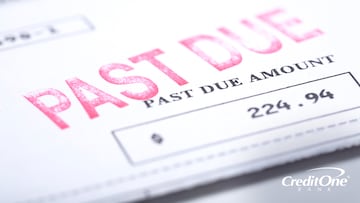You probably already know that making late payments typically doesn’t do your credit score any favors and you should strive to pay your creditors on time, every time. But, if you have a late payment appearing in your credit reports, is there a way to get it removed?
The answer is a resounding maybe. There are no guarantees it can be done and, if it can, it may not be easy. If the information is accurate, it can stay on your credit reports seven years or more. Even if you eventually make or made the payment to bring the account current, a creditor has no obligation to remove the late-payment information. If the information is not accurate, you have a right to dispute the information and try to get it removed from your credit reports, but it will still take some time.
If you find yourself with a late payment on your credit report, here are a few things you can try to get it removed.
Dispute Inaccurate Information
If you believe a creditor reported a late payment inaccurately, you may dispute it. Disputing an error is easy and takes just a few simple steps. You can dispute the error with the credit bureau or bureaus in which the error appears, the creditor that reported the inaccurate information, or both.
Be sure to include as much detail as possible, including what information you’re disputing and why you’re disputing it, and provide supporting documentation (if available) that makes your case that the information is inaccurate. The FTC created sample dispute letters for credit reporting agencies and information providers you can use to help you get started or you can dispute the error online directly with the credit bureau reporting the inaccurate information.
The credit reporting agency will review the information you provide, investigate your claim, and decide whether the information is accurate or a valid error. If you disagree with the findings, you may opt to do any or all of the following: dispute the error with the creditor (if you haven’t done so already), re-dispute with the bureau by including concrete evidence within 15 days, file a complaint with the FTC, or compose a “statement of dispute” (also known as a “consumer statement”) that can be included in your credit reports to give your side of the story to any potential lenders.
Dispute Old Information
Late payments are supposed to fall off of your credit reports after seven years, but that doesn’t always happen. If the late payment is more than seven years old and still appears in your credit reports, it violates the Fair Credit Reporting Act and you can dispute the outdated information.
Negotiate with Your Creditor
A creditor is not required by law to report activity on your account; however, if they do, the information they report should be accurate. So, there’s no guarantee that negotiating with a creditor will work. But it may be worth a shot—especially if you still owe the creditor money.
If you haven’t yet paid your bill, you can try negotiating with the creditor to get them to remove late-payment information in exchange for bringing the account current or partially current. This may be a more attractive option to the creditor than refusing to remove the information, never getting paid, and ultimately selling the account to a collection agency. But, again, it’s entirely up to the creditor whether or not they want to play ball with you.
If you do manage to convince a creditor to remove a late payment, it’s a good idea to get the agreement in writing from them.
Ask a Creditor to Remove a Late Payment Out of Goodwill
This approach differs from a negotiation in that you really don’t have any leverage other than appealing to the creditor’s goodwill. You’re not promising to make a payment in exchange for removing late-payment information; you’re simply asking the creditor to do you a favor. Obviously, the better the customer you’ve been over the years, the better your odds of the creditor working with you. If you’re a habitual late payer, they’re not likely to believe you when you tell them you won’t make another late payment. And you’re going to want to convince them that you’ll be more diligent on paying on time going forward.
This request to remove a late payment is typically done through a goodwill letter, but it doesn’t have to be in old-fashioned written form. It can be done over the phone or via email as well. An effective goodwill letter typically explains why your payment was late and elicits empathy from the creditor. It probably goes without saying, but being pleasant, courteous, and contrite will likely get you a lot further than being unapologetic, demanding, or even rude. Remember, the creditor is under no obligation whatsoever to remove the late payment information if it’s correct. So, go out of your way to convince them you’re worthy of granting you a favor.
If you think you’re going to miss a payment because you’re experiencing a hardship, it’s usually better to contact your lender right away, hopefully before you miss a payment. A creditor may be willing to work with you to make alternate payment arrangements, waive certain fees, or even lower your interest rate until you can get back on your feet. Plus, being proactive could convince them not to report a missed or late payment in the first place.
Tips for Avoiding Late Payments
Most of us don’t want to purposely miss a payment, but sometimes life gets in the way and it happens. Here are a few tips to hopefully help you avoid missing payments in the future.
- Mail it Early. Your payment due date is the date by which the payment must be received, not postmarked. So, if you mail your payment, leave yourself enough time for your payment to get where it’s going through the mail on time.
- Get Payment Notifications. Many credit card companies and other lenders offer the option to receive financial alerts and payment reminders. You can typically receive them via email, text, or even push notifications. They’re also often customizable, so you can be notified when your payment is due, when it’s been received, and more. If you don’t want to receive notifications from the lender, consider setting up your email or smartphone calendar to alert you when your payment is due.
- Change Your Payment Due Date. If you’re continually having a problem making a certain payment due date, look into changing the date to a more convenient time of month, say, closer to when you get paid. Many lenders allow you to change the due date online or with a simple phone call.
- Set up Autopay. One of the best ways to avoid late payments is to automate your finances by setting up autopay with your creditors, if they offer it. If they don’t, you may be able to set up automatic payments with your bank or credit union. Just be sure to update your information if you close an account that’s linked to auto-paying a bill.
- Pay Online or by Phone. If your due date is rapidly approaching, paying by phone or making an online payment is faster than sending it through the mail. Your payment may be posted immediately or typically within a day or two of making the payment.
Having a late payment in your credit reports can be a black mark that prevents you from getting more favorable interest rates or credit terms or even causes a potential lender to turn you down. If you’re unable to get a late payment removed, remember that the impact it has on your credit score should diminish over time. Instead of focusing on the past, focus on ways to improve your credit moving forward. Paying your bills on time, reducing the amount of debt you owe, and minimizing new credit applications all contribute to a healthier credit profile.
After realizing he couldn’t pay back his outrageous film school student loans with rejection notices from Hollywood studios, Sean focused his screenwriting skills on scripting corporate videos. Videos led to marketing communications, which led to articles and, before he knew it, Sean was making a living as a writer. He continues to do so today by leveraging his expertise in credit, financial planning, wealth-building, and living your best life for Credit One Bank.




